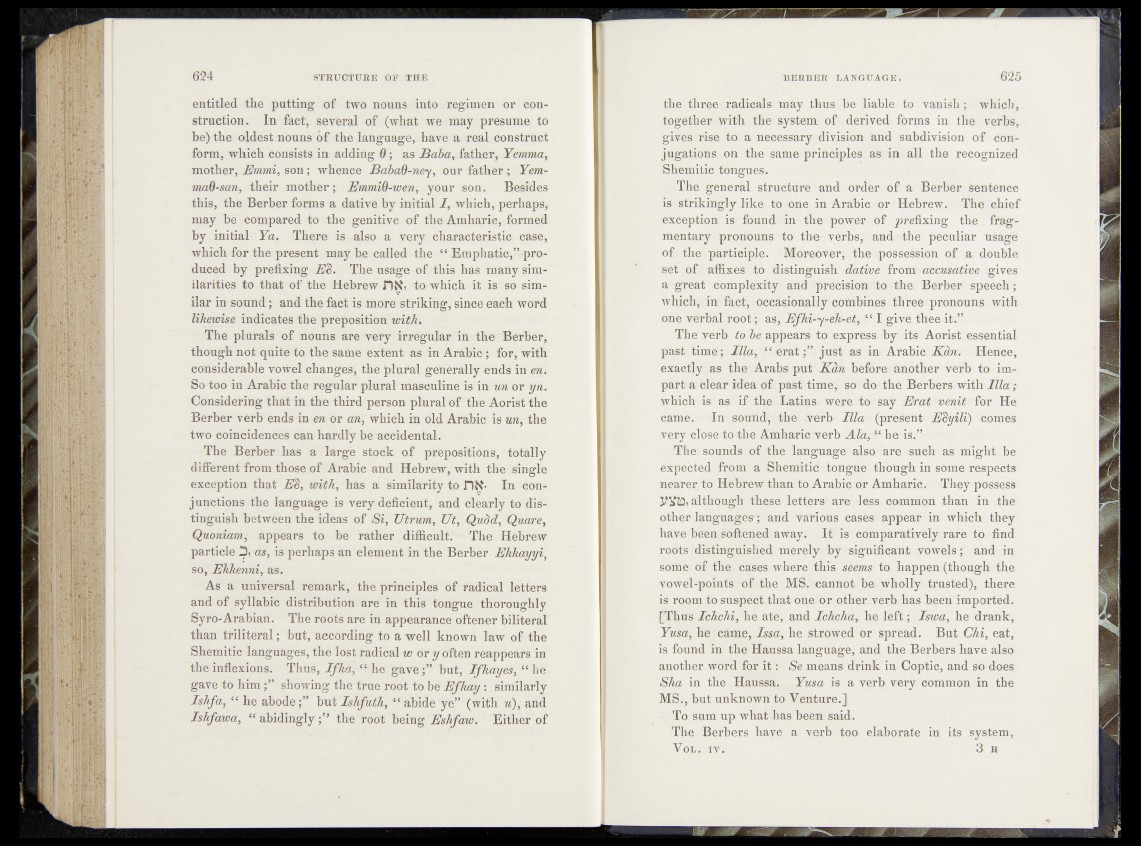
entitled the putting of two nouns into regimen or construction.
In fact; several of (what we may presume to
be) the oldest nouns of the language, have a real construct
form, which consists in adding &; as Baba, father, Yemma,
mother, Emmi, son; whence Babad-ney, our father ; Yem-
maO-san, their mother; EmmiQ-wen, your son. Besides
this, the Berber forms a dative by initial I , which, perhaps,
may be compared to the genitive of the Amharic, formed
by initial Ya. There is also a very characteristic case,
which for the present may be called the “ Emphatic,’’-produced
by prefixing E$. The usage of this has many similarities
to that of the Hebrew to which it is so similar
in sound; and the fact is more striking, since each word
likewise indicates the preposition with.
The plurals of nouns are very irregular in the Berber,
though not quite to the same extent as in Arabic; for, with
considerable vowel changes, the Jdural generally ends men.
So too in Arabic the regular plural masculine is in un or yn.
Considering that in the third person plural of the Aorist the
Berber verb ends in en or an, which in old Arabic is un, the
two coincidences can hardly be accidental.
The Berber has a large stock of prepositions, totally
different from those of Arabic and Hebrew, with the single
exception that EB, with, has a similarity to In conjunctions
the language is very deficient, and clearly to distinguish
between the ideas of Si, Utrum, TJt, Qubd, Quare,
Quoniam, appears to be rather difficulty The Hebrew
particle 2), as, is perhaps an element in the Berber Ekkayyi,
so, Ekkenni, as.
As a universal remark, the principles of radical letters
and of syllabic distribution arenn this tongue thoroughly
Syro-Arabian. The roots are in appearance oftener biliteral
than triliteral; but, according to a well known law of the
Shemitic languages, the lost radical w or y often reappears in
the inflexions. Thus, Ifka, “ he gave;” but, Ifkayes, “ he
gave to him;” showing the true root to be Efkay: similarly
Ishfa, “ he abode;” but Ishfuth, “ abide ye.” (with u), and
Ishfawa, “ abidingly ;” the root being Eshfaw. Either of
the three radicals may thus be liable to vanish; which,
together with the system of derived forms in the verbs,
gives- rise to a necessary division and subdivision of conjugations
on the same principles as in all the recognized
Shemitic tongues, &
The general structure and order of a Berber sentence
is strikingly like to one in Arabic or Hebrew. The chief
exception is found ini'the power of prefixing the fragmentary
pronouns te, *t>he>- verbs,! and the peculiar usage
of the participle. Moreover, the possession of a double
set of affixes to distinguish dative from accusative gives
a great complexity and precision to the Berber speech ;
which, iu occasionally ifeifibhmS 1§> with
one verbal root; as, Efki-y-ekret,x ‘ I give thee it.”
The verb to be appears to express by: its Aorisfc essential
past time; Ilia, “ erat ;”;:justas in Arabic ^dni Hence,
exactly as the Arabs put Kotw before another verb to impart'
a clear idea of past time, so do the Berbers with Ilia ;
which -is as if the Latins were to say Erat venit for He
came. In sound, .the verb Ilia ? (present EByili) comes
very; close to the Amharic verb AlafL“ he is.'l»?
The sounds of the language also afe such- as might be
expected from a Shemitic tongue though in some respects
nearer, to Hebrew than to Arabic or Amharic. They possess
If tD> although these letters are less common thafrtmi- the
other languages-; and various cases appear in [which they
have been softened away. It is comparatively rare to find
roots distinguished merely by significant wow els; and in
some; of the cases where this seems to happen (though the
vowel-points of the MS. cannot be. wholly trusted), there
is room to suspect that one’or other verb has been imported.
[Thus Ichchi, he ate, and Ichcha, he left; Iswa, he drank,
Yusa, he came, Issa, he strowed or spread. But Chi, eat,
is found in the Haussa language, and the Berbers have also
another word for i t : Se means drink in Coptic, and so does
Sha in the Haussa. Yusa is a verb very common in the
MS., but unknown to Venture.]
To sum up what has been said.
The Berbers have a verb too elaborate in its system,
Vol. j f> iHf , „ 3 H